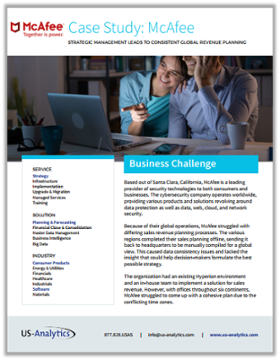Data sharing operations, even in the smallest of companies, can pose a real challenge. In widely-scaled enterprises, it can seem as though it’s impossible to reliably share data and conduct operations across time zones and language barriers. Enterprises are persistently searching for the perfect solution to their organizational communication and global reporting problems.
The Oracle EPM Cloud can help connect your enterprise by allowing users to share standardized data, making it easier to communicate and share metrics across the world. It also provides leadership and management the ability to see real-time global data at-a-glance, helping decision-makers react to new data in a timelier and more insightful manner.
Overcoming barriers to streamline operations
It’s difficult to do things like consistently plan for sales revenue or even communicate when your data centers, offices, and sales teams are in different locations, different time zones, or even different continents. In this ever-shrinking world, it’s more important than ever that companies make globalization a priority.
The barriers to streamlined operations make it seem as though finding a solution is out of the question. Fortunately, using a solution like the Oracle EPM Cloud, makes streamlining globalized operations easier than ever. Below we’ve delved into organizational communication and global reporting, the barriers these operations face, and how the Oracle EPM Cloud can help you overcome those barriers.
Organizational communication
Communicating within your organization should be easy, but unfortunately, that’s not always the case. Differences in time zones make communicating with a global team to produce real-time results difficult. Sales teams across different continents struggle with relaying their numbers in a timely enough manner for them to be relevant, and corporate headquarters struggle to interpret numbers sent by the various sales teams as well as other departments across the enterprise. It’s a lose-lose.
Enter the Oracle EPM Cloud. Your EPM Cloud solution could save you time by implementing effective organizational communication across your entire enterprise. An example of this would be using the Planning (formerly PBCS) business process in Oracle EPM Cloud Standard Edition to forecast sales projects for the next quarter. You can use the Oracle EPM Cloud Planning solutions to forecast for a variety of processes backed by financial data, including…
- Sales and quota planning
- Workforce planning
- Capital asset planning
- And a range of other processes
Global reporting
With a global enterprise, your team faces challenges in adequately reporting and gaining visibility into financial data across the globe. Both internal and external reporting becomes more difficult when placed in a worldwide context, and businesses sacrifice other operational priorities in order to satisfy varying global reporting requirements.
The Oracle EPM Cloud is the solution to your reporting conundrum. Consider using a feature such as Oracle EPM Cloud Enterprise Edition’s Narrative Reporting (formerly EPRCS) function to easily prepare and standardize your global reports. Narrative Reporting is a business process for management, narrative, and regulatory reporting that makes providing internal and external stakeholders with different types of integral reports as simple as the process can be.
You can learn more about narrative reporting in this blog post.
Why Choose a Cloud-based EPM Technology?
It’s true that with Oracle EPM technology, the cloud isn’t your only choice. Many organizations choose on-premises technology because it works best within the contest of their organization. However, it might not make as much sense for a global operation.
Siloed Solutions
The Oracle EPM Cloud has tremendously changed their licensing structure, which you can read more about here. The biggest takeaway is now every solution you need is included in one license, with the ability to easily switch between solutions, taking care of data consistency issues you might’ve faced with an on-premises solution.
If you go with on-premises Oracle EPM solutions, such as Hyperion Financial Management (HFM) or Hyperion Planning, you have to install the solutions separately, and ensure that they’re integrated accurately.
For a global operation, this might be an attractive solution to keep everyone on the same page and working in the same environment. However, you’re probably still thinking, “why can’t I simply use a VPN?
VPN vs. The Cloud
Traditionally, remote access to your company’s solutions and files has been through a virtual private network, or VPN. A corporate VPN has allowed you to access company resources no matter where you are, including EPM applications. VPN provides you with a connection to your organization’s environment so that you can transmit and obtain data securely.
Similarly, the cloud allows access to your company’s data and solutions through an internet connection. Many organizations have moved to Amazon Web Services and Microsoft Azure for hosting, while even more used cloud-based tools such as Dropbox and project management solutions, like Asana or Trello.
Many organizations are already on the cloud in some shape or form, and many others have initiatives to move in that direction. One of the biggest issues with using on-premises EPM solutions and VPNs is that they require significant upfront hardware costs. Additionally, as your organization grows (or goes global), your hardware needs increase — causing you to invest more in hardware and increase pressure on your IT team. Additionally, you can run into other issues with VPN, such as working on and saving large files and creating version histories. Plus, VPNs themselves can be costly for adequate security.
The Oracle EPM Cloud eliminates those upfront hardware costs as well as scalability concerns. You can easily scale up or down based on your needs. You don’t have to worry about installing patches, but rather receive automatic updates. Basically, you receive more flexibility, which is important for a global business looking to standardize processes, identify data trends, and make changes across the organization. Additionally, the EPM allows you to connect from anywhere, on any device, with no VPN client required to access your cloud solution from a cell phone or tablet.
What about Security?
Ensuring that your data is secure is obviously a No. 1 priority and something that is brought up often when you talk about the cloud. The truth is security threats are getting more sophisticated and midsize companies can’t keep up — reporting an average of almost 17,000 alerts per week and only 4 percent investigated, according to Oracle. Additionally, 66 percent of cybersecurity jobs cannot be filled by candidates with an adequate skillset.
Things are tough out there, security-wise, which is another reason to consider the cloud.
The Oracle EPM Cloud has various layers of defense and provides secure access to your data. Oracle takes the security of your data seriously, with an intelligent automation service to detect advanced threats and persistent attacks, plus a team of experienced cybersecurity professionals well-versed in Oracle’s security method.
In short, your data is most likely better protected by Oracle’s cloud than your own server.
Obtaining Standardized Processes
Once you’ve decided on the Oracle EPM Cloud, how can you be sure that your processes are repeatable and standardized across the globe? How can you be sure your employee buy-in to those processes and adequately put them into effect?
The best method of ensuring consistency in your processes is to look to an outside expert. EPM firms have experts who can look at each of your global offices and understand where they are today and where they need to be. They can also make recommendations based on best practices they’ve learned from decades in the industry.
For example, McAfee used advisory services to gather information about their processes at every office to come up with a streamlined sales planning revenue process, allowing them to obtain a global view of their performance. You can read their full story here.
Actionable Tip: Set up an appointment to assess your global EPM strategy with a free assessment.
Conclusion
Better insight into your enterprise’s health comes from a clear picture of its data. And a clear picture of its data can come from your EPM Cloud solution — if it’s strategically implemented. There are barriers to overcome when running a global enterprise, such as organizational communication and global reporting, but with the right EPM Cloud product, you can make major strides in globalizing your enterprise.
Interested in learning how you can streamline global operations? Schedule an assessment today.





